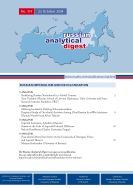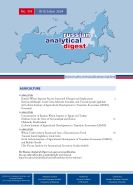Russian Analytical Digest (RAD)
The Russian Analytical Digest (RAD) analyzes recent events, trends and developments within contemporary Russian politics, economics and business, foreign policy, security and society. Each issue contains original academic and policy relevant research articles by authors from across the globe, and topical statistical data, graphics and opinion polls. The series is produced by a partner network that includes the Center for Security Studies (CSS) at ETH Zürich, the Research Centre for East European Studies (FSO) at the University of Bremen, the Institute for European, Russian and Eurasian Studies (IERES) at the George Washington University and the Center for Eastern European Studies (CEES) at the University of Zurich. The RAD is edited by external page Fabian Burkhardt, external page Matthias Neumann, external page Robert Orttung, external page Jeronim Perović, external page Heiko Pleines, and external page Hans-Henning Schröder.
The series is partnered with the German language publication Russland-Analysen, the Russian Regional Report, and the Caucasus Analytical Digest (CAD).
All Issues
chevron_right All RAD IssuesCurrent Issues

No. 319: Russian Imperialism and Decolonisation
This issue addresses the complex debate around Russian imperialism and decolonization starting from the related academic literature. The first contribution summarizes the interplay between nationalism and imperialism in modern Russian nationhood. The second contribution addresses a gap in the literature and presents main insights from an empirical study of decolonial activism among (non)Russian anti-war initiatives in Russia. The third contribution conceptualizes imperial sentiment and subaltern rhetoric by placing Russia on the scale of imperial/colonial difference. The last contribution presents the genealogy of the application of postcolonialism to “all things post-Soviet” on the basis of an extensive literature review.

No. 318: Agriculture
After the invasion of Ukraine, Russia continued its wheat export growth, for example to Iran, while at the same time multinational agricultural trading companies exited the country. Also, the importance of grain exports via Novorossiysk port increased. This issue examines the consequences of these developments. Market concentration could further increase, restrict domestic competition and erode producer prices. In conjunction with the export tax’ financial burden on farmers, Russia's continued wheat production and export growth could come to a standstill. However, the impact on international markets and in particular the Egyptian and Turkish wheat import markets remains to be seen.